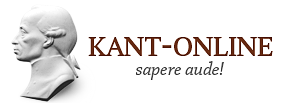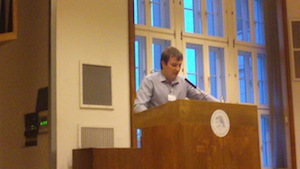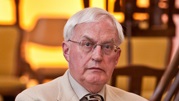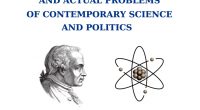Kant’s Question “What is Enlightenment?” Was Answered at the Conference in Berlin
Interdisciplinary Conference consisted of series of reports by the invited guests followed by general discussions. Conference hosted Kant scholars from Germany, Russia, Austria, England, Belarus and China.
The participants tried to answer the questions of education, training and moral philosophy that were relevant in Kant’s time and remain relevant today. The conference was organized by the members of the German-Russian philosophical circle Сarina Pape, Holger Sederström and Ivan Boldyrev, and lasted three days (September 24-26). Kant Institute of IKBFU was the partner of the conference in the Kaliningrad region.
The conference was opened by Prof. Dr. Tobias Rosefeldt from Humboldt University who helped organize the event. In his opening speech, he said: “I am pleased to see that the initiative of organizing such events comes from students, rather than some institution. It is important to realize that participation in conferences and discussions is a wonderful addition to educational process.”
Representative of Kant Institute, Alexey Trotsak Ph.D. welcomed the participants on the first day of the conference: “In his work Kant used the expression «sapere aude!» which has now become so popular. This expression comes from poet Horace’s “Epistles” quoted by Kant:
Who begins a project has it half done; dare to know;
begin! Whoever postpones the hour of
living rightly is like the yokel who is waiting
until the river runs out: but it will glide
onwards and continue to glide forever in its flow.
I wish all participants to have the courage in making decisions and the desire to explore ourselves and the world.”
Plenary papers were reported by Prof. Martin L. Davies (Leicester), Prof. Dr. Miloš Vec (Wien) and Prof. Dr. Frederik Stjernfelt (Kopenhagen). In his report “Selbstdenken oder Wissenschaft? Aufklärung als Infragestellen der
Universität” (“Independent Thinking or Science?”) Martin Davis highlighted the issue of the significance of universities in the education of individuals by setting educational institutions against the thinking person.
Miloš Vec demonstrated a journey into the history of the concept of “education” from the political, legal and moral point of view. He actualized this concept in today’s law.
In addition to professional philosophers, representatives of medical institutions were invited as well. For example, Prof. Dr. Ingrid Mühlhauser (Hamburg) described the situation with public education in the field of medicine, and talked on how people who know about diseases and their symptoms may avoid them or reduce the risk of serious consequences.
The meeting was held in a friendly atmosphere. On the first day of the conference reports were accompanied by the music of Dmitri Schostakowitsch, Sergei Bortkiewicz and Franz Schubert.
Following the conference, the organizers intend to publish a collection of works and to continue cooperation with Kant Institute in order to hold a similar event in Kaliningrad.





